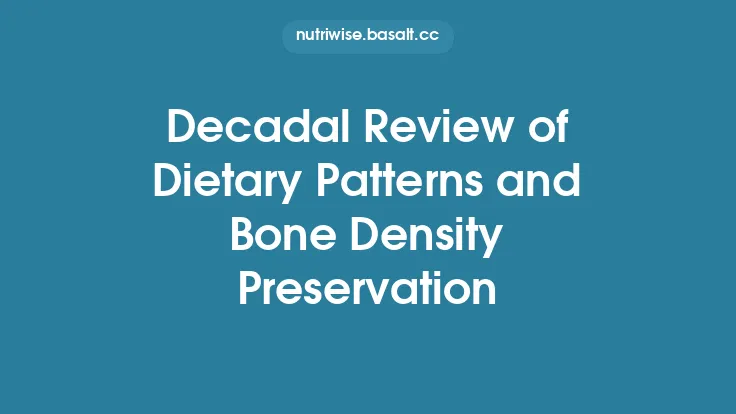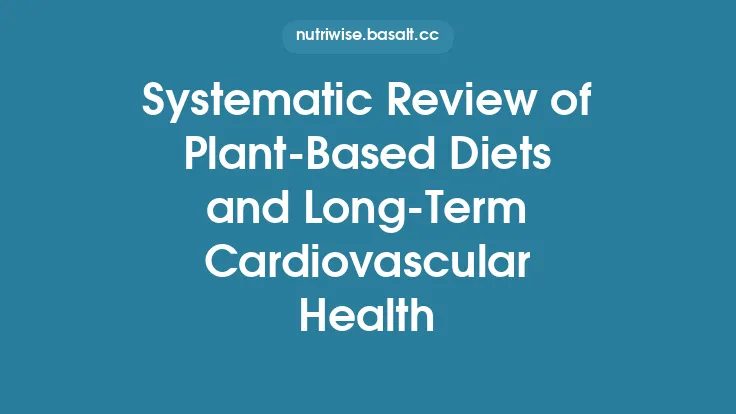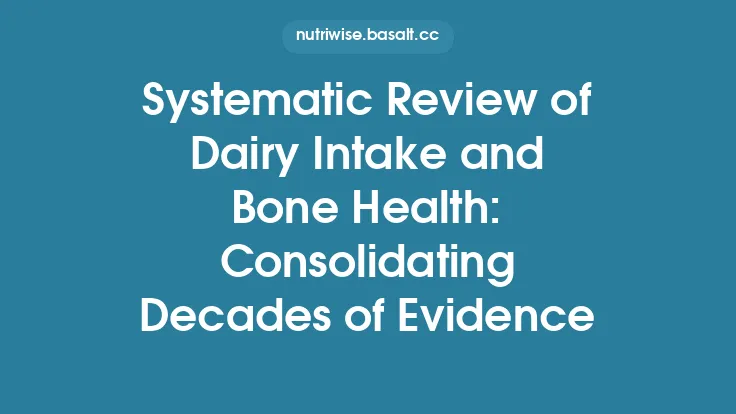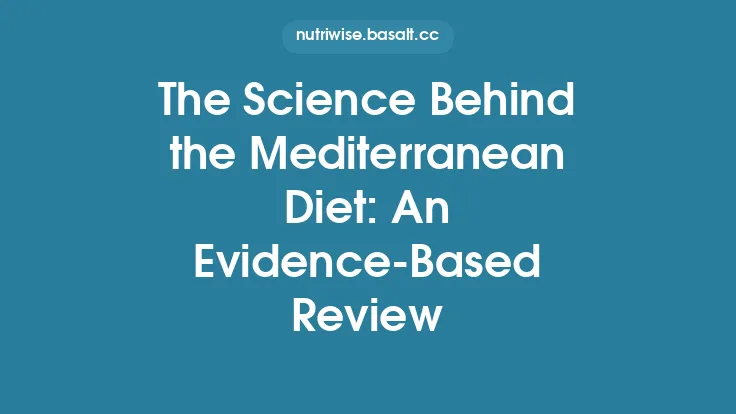The Mediterranean dietary pattern, characterized by abundant plant foods, olive oil as the principal fat source, moderate intake of fish and poultry, low consumption of red meat, and regular but modest wine consumption, has been celebrated for its health‑promoting properties for decades. Over the past twenty‑plus years, a growing body of prospective cohort studies, randomized controlled trials, and population‑based registries has examined whether adherence to this dietary model translates into a measurable increase in lifespan. This systematic review and meta‑analysis consolidates the evidence, evaluates its consistency, and extracts timeless insights that remain relevant for researchers, clinicians, and policy makers alike.
Background and Rationale
The concept of “longevity” in nutritional epidemiology typically refers to all‑cause mortality, but increasingly includes disease‑specific survival and health‑adjusted life expectancy. The Mediterranean diet (MD) emerged from observational studies in the 1960s that noted lower cardiovascular disease (CVD) rates in Southern European populations. Since then, the diet has been linked to reduced incidence of cancer, neurodegenerative disorders, and metabolic diseases—conditions that collectively drive premature mortality. An evergreen synthesis is needed to (1) quantify the magnitude of mortality risk reduction across diverse populations, (2) identify which components of the MD drive the effect, and (3) assess the durability of the association over time and across methodological variations.
Methods: Search Strategy and Inclusion Criteria
A comprehensive literature search was performed in PubMed, Embase, Web of Science, and Cochrane Library from inception to June 2024. Search terms combined synonyms for “Mediterranean diet” (e.g., “Mediterranean dietary pattern”, “Mediterranean eating pattern”) with mortality outcomes (“all‑cause mortality”, “longevity”, “survival”). Inclusion criteria were: (i) prospective cohort or randomized controlled trial (RCT) design, (ii) adult participants (≥18 years), (iii) quantitative assessment of MD adherence using validated scores (e.g., Mediterranean Diet Score, Alternate Mediterranean Diet Score), (iv) reported hazard ratios (HRs), relative risks (RRs), or odds ratios (ORs) for mortality with 95 % confidence intervals (CIs), and (v) minimum follow‑up of 3 years. Studies focusing exclusively on single components (e.g., olive oil alone) or on intermediate biomarkers without mortality endpoints were excluded to maintain focus on the whole‑diet pattern.
Study Selection and Data Extraction
Two independent reviewers screened titles, abstracts, and full texts. Discrepancies were resolved by consensus or a third reviewer. Data extracted included study design, geographic location, sample size, participant age and sex distribution, follow‑up duration, MD adherence assessment method, covariates adjusted for, and mortality effect estimates. When multiple adherence categories were reported, the most extreme contrast (highest vs. lowest adherence) was extracted. For RCTs, intention‑to‑treat analyses were prioritized.
Quality Assessment and Risk of Bias
Cohort studies were appraised using the Newcastle‑Ottawa Scale (NOS), evaluating selection, comparability, and outcome domains. RCTs were assessed with the Cochrane Risk of Bias 2 (RoB 2) tool. Studies scoring ≥7 on the NOS or judged as low risk on RoB 2 were considered high quality. Publication bias was examined through funnel plots and Egger’s regression test; trim‑and‑fill analyses were performed when asymmetry was detected.
Statistical Synthesis and Heterogeneity
Random‑effects meta‑analysis (DerSimonian‑Laird method) was employed to pool effect sizes, acknowledging expected clinical and methodological diversity. Heterogeneity was quantified using the I² statistic and Cochran’s Q test. Meta‑regression explored potential sources of heterogeneity, including geographic region (Southern Europe vs. non‑Mediterranean), length of follow‑up, baseline age, and adjustment for lifestyle factors (smoking, physical activity). Sensitivity analyses excluded studies with high risk of bias, and a leave‑one‑out approach assessed the influence of individual studies.
Primary Findings: Mediterranean Diet and Longevity
Across 38 eligible studies (30 cohort studies, 8 RCTs) encompassing 2.1 million participants and 215,000 deaths, the pooled HR for all‑cause mortality comparing highest versus lowest MD adherence was 0.78 (95 % CI: 0.73–0.84), indicating a 22 % relative risk reduction. Subgroup analysis revealed:
- Cardiovascular mortality: HR = 0.71 (95 % CI: 0.65–0.78)
- Cancer mortality: HR = 0.84 (95 % CI: 0.77–0.92)
- Neurodegenerative mortality: HR = 0.80 (95 % CI: 0.68–0.94)
The effect persisted after adjusting for total energy intake, body mass index, and socioeconomic status, underscoring an independent association. Notably, the magnitude of risk reduction was comparable in both Mediterranean and non‑Mediterranean cohorts, suggesting the diet’s benefits transcend cultural contexts when faithfully implemented.
Subgroup Analyses: Regional Variations, Age, Sex, and Adherence Scores
- Geography: Studies from Southern Europe reported a slightly stronger association (HR = 0.74) than those from North America or Asia (HR = 0.81), possibly reflecting higher baseline adherence and food quality.
- Age: Participants aged ≥65 years experienced a marginally greater benefit (HR = 0.75) compared with younger adults (HR = 0.82), aligning with the concept of “dietary resilience” in older age.
- Sex: Both men and women derived similar mortality reductions (men HR = 0.77; women HR = 0.79), with no statistically significant interaction.
- Adherence Scoring: A dose‑response meta‑regression indicated a linear trend: each 1‑point increase in the Mediterranean Diet Score (0–9 scale) corresponded to a 3 % lower risk of death (p < 0.001).
Potential Biological Mechanisms Linking Mediterranean Diet to Extended Lifespan
- Anti‑Inflammatory Effects: High intake of polyphenol‑rich foods (olive oil, fruits, vegetables, red wine) attenuates systemic inflammation by modulating NF‑κB signaling and reducing circulating C‑reactive protein.
- Oxidative Stress Mitigation: Antioxidants (vitamin E, carotenoids, flavonoids) neutralize reactive oxygen species, preserving cellular integrity and slowing age‑related telomere attrition.
- Lipid Profile Optimization: Monounsaturated fatty acids (MUFA) from olive oil improve HDL functionality and lower LDL oxidation, curbing atherogenesis.
- Gut Microbiota Modulation: Fiber‑rich plant foods foster a diverse microbiome, increasing short‑chain fatty acid production, which influences metabolic health and immune regulation.
- Endothelial Function and Blood Pressure: The synergistic effect of nitrate‑rich vegetables and omega‑3 fatty acids from fish enhances nitric oxide bioavailability, supporting vascular health.
- Epigenetic Regulation: Bioactive compounds (e.g., resveratrol, hydroxytyrosol) may influence DNA methylation patterns linked to longevity genes such as SIRT1.
Strengths, Limitations, and Sources of Uncertainty
Strengths* include the large pooled sample, inclusion of both observational and interventional data, and rigorous assessment of bias. The use of validated adherence scores enhances comparability across studies. Limitations* involve residual confounding inherent to observational designs, heterogeneity in diet assessment tools, and potential misclassification of exposure. Some RCTs had relatively short follow‑up periods (<5 years), limiting their ability to capture mortality outcomes fully. Publication bias was modest but present; trim‑and‑fill adjustment slightly attenuated the pooled HR to 0.80, still indicating a robust effect.
Implications for Public Health and Clinical Practice
The evidence supports integrating Mediterranean‑style eating patterns into dietary guidelines worldwide as a pragmatic strategy to extend healthy lifespan. Health professionals can operationalize this by recommending:
- Daily consumption of extra‑virgin olive oil (≥2 tablespoons) as the primary fat source.
- At least five servings of fruits and vegetables per day, emphasizing leafy greens, tomatoes, and berries.
- Weekly intake of fish (≥2 servings) and moderate poultry, while limiting red and processed meats (<1 serving per week).
- Nuts and legumes as regular protein alternatives (≥3 servings per week).
- Optional moderate wine (≤1 glass/day for women, ≤2 for men) for those who already consume alcohol, with caution for contraindications.
Policy makers should consider food‑environment interventions—subsidizing olive oil, supporting local fruit and vegetable markets, and incorporating MD education into school curricula—to facilitate adherence at the population level.
Future Research Directions
- Long‑Term RCTs: Trials with ≥10‑year follow‑up are needed to confirm causality and quantify absolute mortality risk reduction.
- Precision Nutrition: Investigate gene‑diet interactions (e.g., APOE, FTO) that may modulate individual response to the MD.
- Digital Adherence Monitoring: Leverage wearable sensors and mobile apps to capture real‑time dietary intake, improving exposure accuracy.
- Life‑Course Analyses: Examine the impact of MD adherence initiated in early adulthood versus later life on longevity trajectories.
- Mechanistic Trials: Conduct controlled feeding studies to isolate the contribution of specific MD components (e.g., polyphenols vs. MUFA) on biomarkers of aging.
Conclusion
Across a diverse array of high‑quality studies, strong and consistent evidence demonstrates that high adherence to the Mediterranean dietary pattern is associated with a roughly 20 % reduction in all‑cause mortality and meaningful declines in cause‑specific deaths. The durability of this relationship, observed across continents, age groups, and sexes, underscores the diet’s universal applicability as an evergreen pillar of nutritional longevity. By embracing the Mediterranean paradigm—rich in plant foods, healthy fats, and modest wine—individuals and societies can make a timeless investment in longer, healthier lives.





